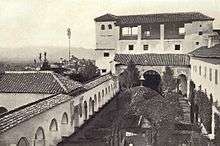Generalife
| Generalife | |
|---|---|
|
Native name Arabic: جَنَّة الْعَرِيف | |
|
The Court of la Acequia | |
| Location | Granada, Andalucia, Spain |
| Built | 14th century |
| Governing body | Ministry of Culture |
| Official name: Alhambra, Generalife and Albayzín, Granada | |
| Type | Cultural |
| Criteria | i, iii, iv |
| Designated |
1984 (8th session) 1994 (18th session – Extension) |
| Reference no. | 314 |
| Region | Europe |
The Palacio de Generalife (Spanish pronunciation: [xe.ne.ɾa.ˈli.fe]; Arabic: جَنَّة الْعَرِيف Jannat al-‘Arīf, literally, "Architect's Garden") was the summer palace and country estate of the Nasrid Emirs (Kings) of the Emirate of Granada in Al-Andalus, now beside the city of Granada in the autonomous community of Andalusia, Spain.
History
The palace and gardens were built during the reign of Muhammad III (1302–1309) and redecorated shortly after by Abu I-Walid Isma'il (1313–1324). Much of the garden is a recent reconstruction of dubious authenticity.[1] Théophile Gautier, a mid-19th century visitor, complained that
Of the Generalife nothing now remains but some arcades and some large panels of arabesques, unfortunately plastered over with layers of whitewash that have been applied again and again with all the obstinacy of a dispiriting cleanliness. Little by little the delicate sculptures and the marvellous guilloches of this fairy-like architecture have been obliterated, filled up, and engulfed. What is at present nothing more than a faintly-vermiculated wall, was formerly open lace-work as fine as those ivory leaves which the patience of the Chinese carves for fans.[2]
Design

The complex consists of the Patio de la Acequia (Court of the Water Channel or Water-Garden Courtyard), which has a long pool framed by flowerbeds, fountains, colonnades and pavilions, and the Jardím de la Sultana (Sultana's Garden or Courtyard of the Cypress). The former is thought to best preserve the style of the medieval Persian garden in Al-Andalus.
Originally the palace was linked to the Alhambra by a covered walkway across the ravine that now divides them. The Generalife is one of the oldest surviving Moorish gardens.[3]
20th century
The present-day gardens were started in 1931 and completed by Francisco Prieto Moreno in 1951. The walkways are paved in traditional Granadian style with a mosaic of pebbles: white ones from the River Darro and black ones from the River Genil.[4]
The Generalife is a UNESCO World Heritage Site in Granada, along with the Alhambra palace and gardens, and the Albayzín district.
- View of the Cypress Court.
 A window of the Generalife
A window of the Generalife Splash from fountains evaporating off stone cools the air
Splash from fountains evaporating off stone cools the air
There is an imitation of part of the Generalife at Roundhay Park in Leeds, UK.
See also
References
- ↑ Marion Harney. "Gardens and Landscapes in Historic Building Conservation". Books.google.com. p. 908. Retrieved 2016-10-31.
- ↑ Romantic Castles and Palaces, As Seen and Described by Famous Writers, edited and translated by Esther Singleton; New York: Dodd, Mead & Company, 1901; pp. 169-173.
- ↑ Burton, Rosemary and Cavendish, Richard (2003). Wonders of the World: 100 Great Man-Made Treasures of Civilization. Sterling Publishing Company, Inc., ISBN 1-58663-751-7, p.27.
- ↑ Núñez, J. Agustín (Ed.). (2002). Muslim and Christian Granada. Edilux. ISBN 84-95856-07-7.
External links
| Wikimedia Commons has media related to Generalife. |
- Alhambra and Generalife Official Site
- Alhambra, Generalife and Albayzín, Granada
- Museum With No Frontiers
- BBC Picture Gallery
- Generalife plan
Coordinates: 37°10′37″N 3°35′07″W / 37.17694°N 3.58528°W

